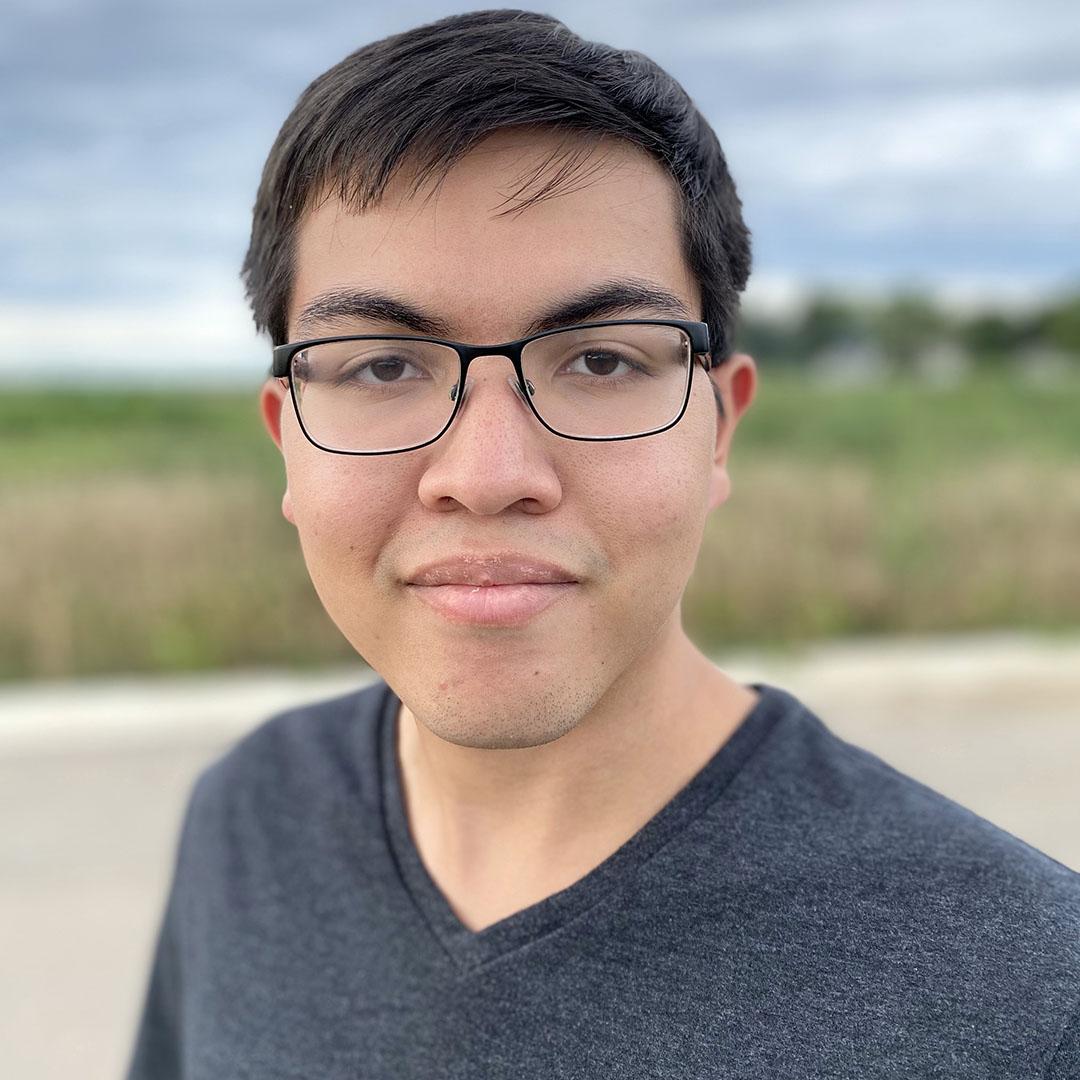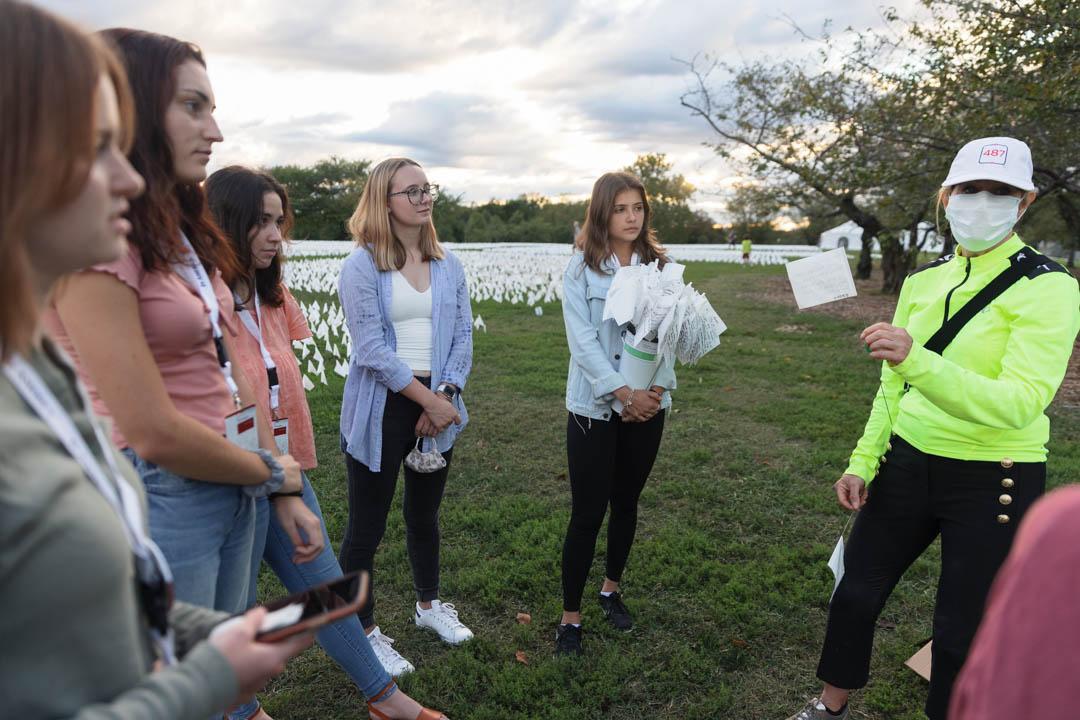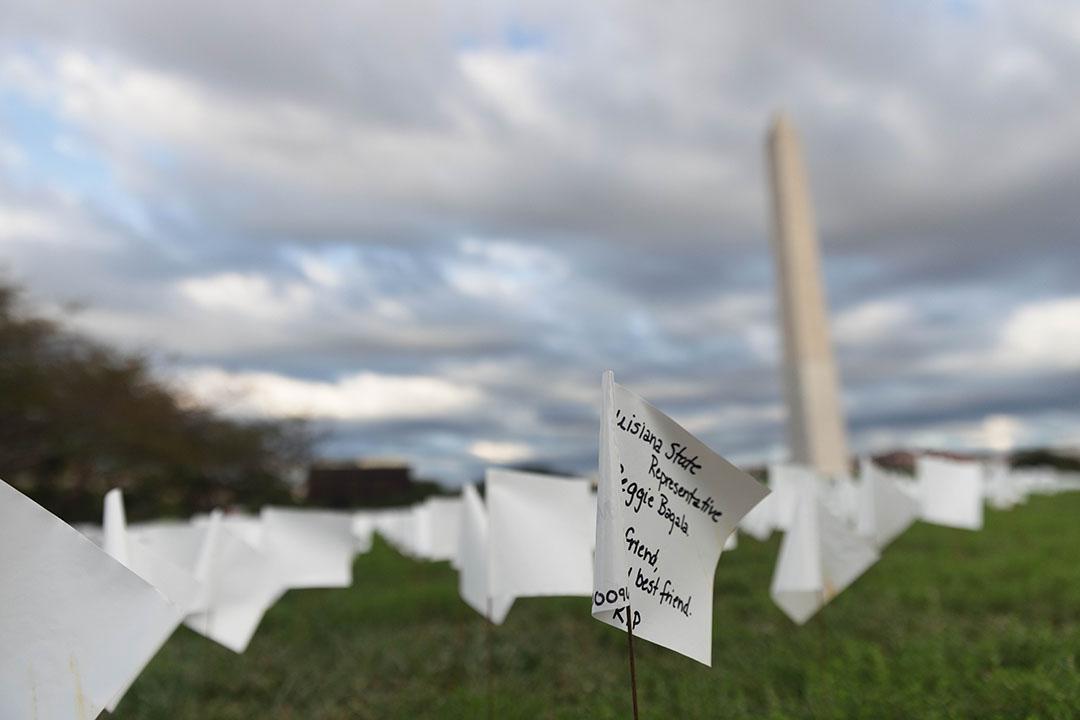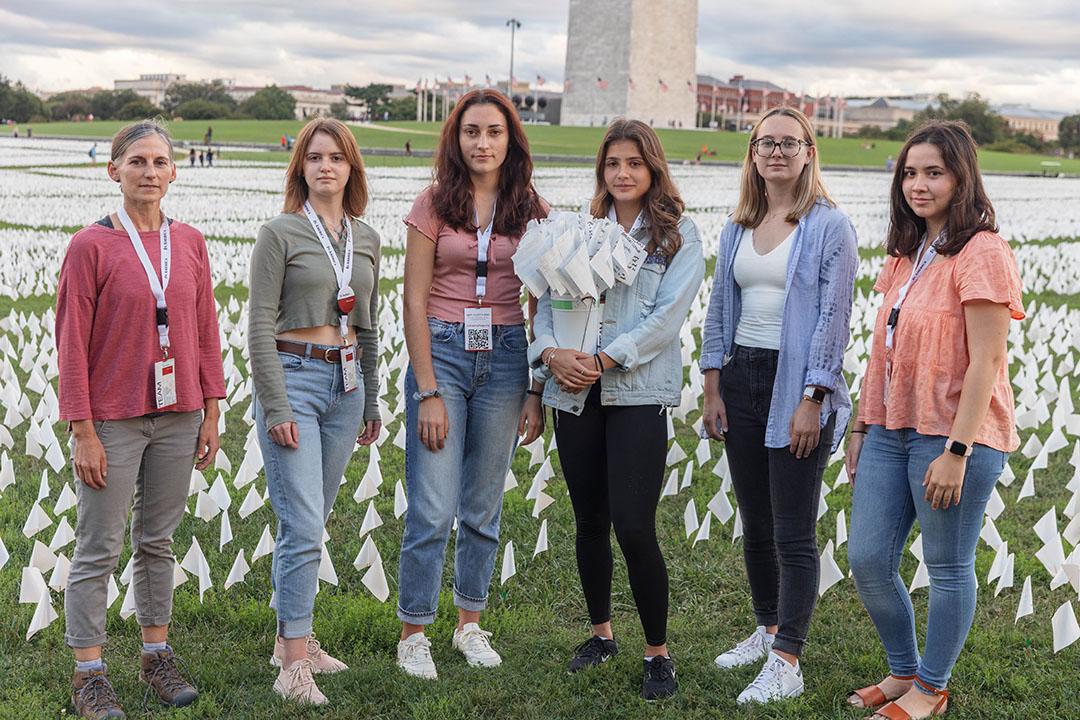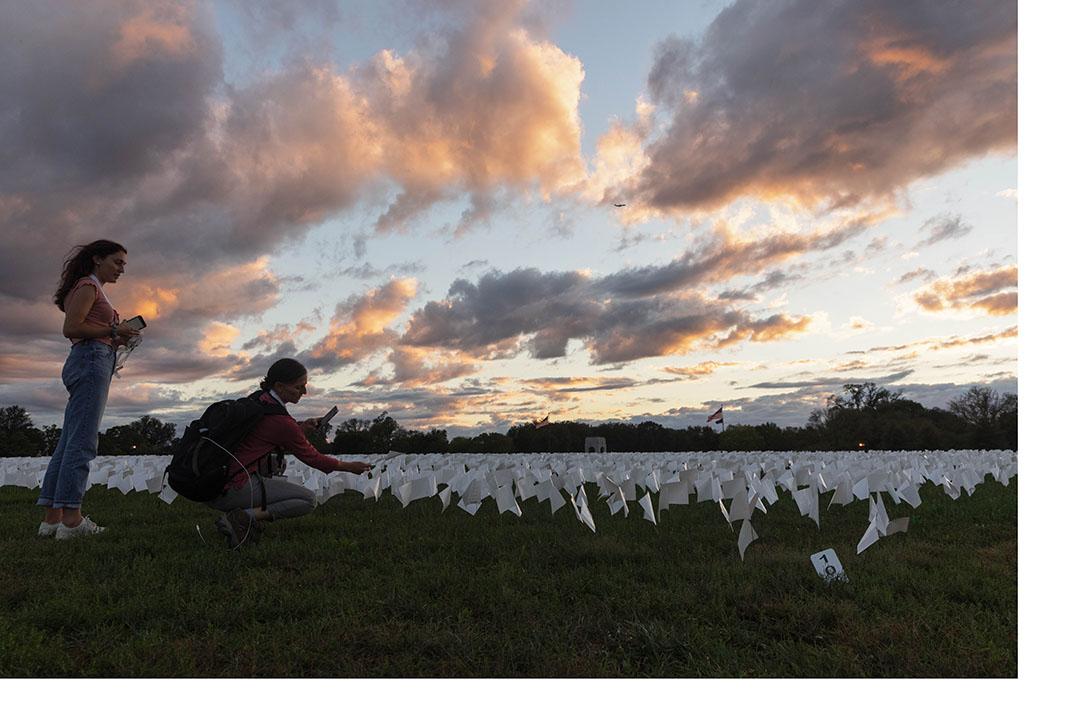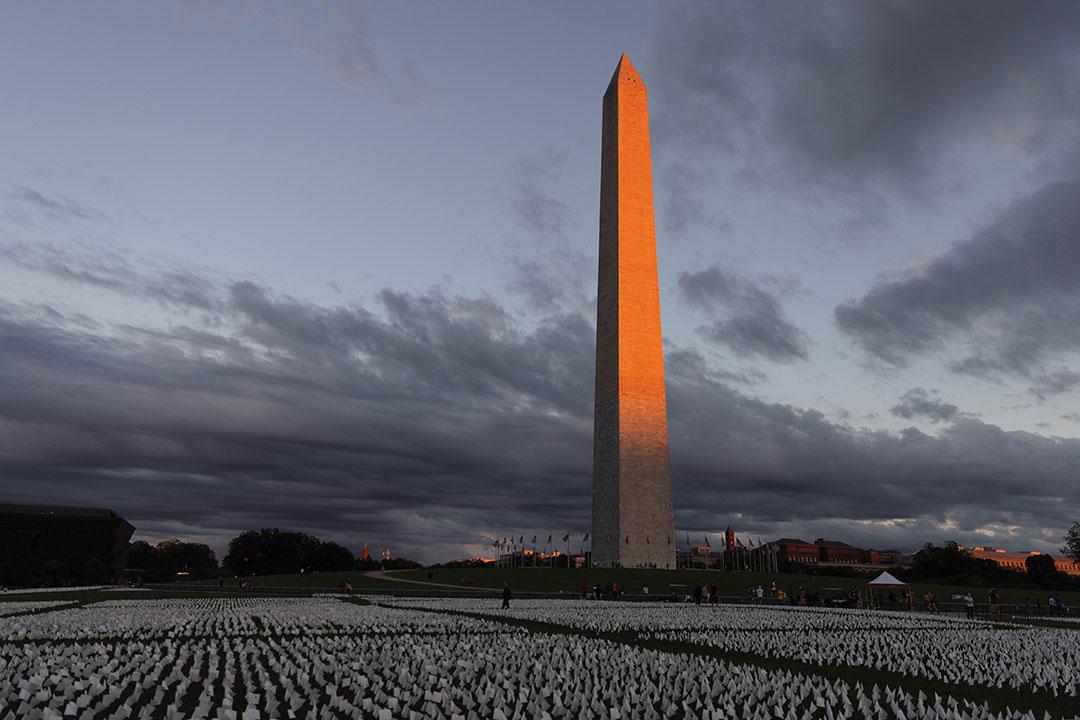Pandemic Reflections Series: Commemorating and Documenting the First Four Years of COVID-19
Pandemic Reflections Series
Commemorating and Documenting the First Four Years of COVID-19
March 5–7, 2024
In-Person and Online
The “Rituals in the Making” research team — a five-year, National Science Foundation-funded study of COVID death, mourning and memorialization based in GW's Department of Anthropology — hosted a series of events entitled, “Pandemic Reflections Series: Commemorating and Documenting the First Four Years of COVID-19.” The events were timed to coincide with National COVID Remembrance Day (the first Monday of March, 2024) and brought together scholars, artists, activists, writers, journalists and the bereaved to reflect on experiences of the pandemic in the United States over the preceding four years.
The series featured a joint book presentation on March 6, 2024, with authors Martha Greenwald and Nicholas Montemarano, along with pre-recorded remarks by Dr. Anthony Fauci; a virtual seminar on pandemic archiving on March 5; and a behind-the-scenes look at the ongoing efforts to preserve the flags of the In America: Remember installation on March 7.
Series Schedule
MARCH 5
Memory Loss: COVID as a Slow Disaster | 7 p.m. EST
This virtual seminar featured Dr. Scott Gabriel Knowles, a historian of risk and disaster at the Korean Advanced Institute of Science and Technology, and host of COVIDCalls, a daily discussion of the pandemic with a diverse collection of disaster experts. The seminar was moderated by Sebastian Sirais and Dr. Richard Grinker.
- Speakers
Scott Gabriel Knowles
Scott Gabriel Knowles is a historian of disaster and serves as a Professor in the Graduate School of Science and Technology Policy at the Korea Advanced Institute of Science and Technology. He has lived in South Korea with his family since 2021. He is the host of #COVIDCalls and the author of The Disaster Experts: Mastering Risk in Modern America. He is also the co-editor of Legacies of Fukushima: 3.11 in Perspective (with Kyle Cleveland & Ryuma Shineha). Currently he's finishing a new book titled The United States of Disaster.
Sebastian Sirais
Sebastian Sirais (BA ‘24) is a student of International Affairs at George Washington University and has served as a research assistant on Rituals in the Making since the spring of 2021.
Dr. Richard Grinker
Dr. Richard Grinker is Professor of Anthropology and International Affairs at the George Washington University. He conducts cross-cultural research on neurodiversity, mental illness, developmental disorders, and stigma. He is the author of Nobody’s Normal: How Culture Created the Stigma of Mental Illness (NY: W.W. Norton) and Unstrange Minds: Remapping the World of Autism (NY: Basic Books), among other books. He is editor-in-chief of Anthropological Quarterly.
MARCH 6
Against Forgetting: Bearing Witness through Pandemic Narratives | 4–6:30 p.m. EST
1957 E St. NW, Room 113
George Washington University
A joint book presentation on COVID-19 loss and remembrance with authors Nicholas Montemarano (If There Are Any Heavens) and Martha Greenwald (Who We Lost: A Portable COVID Memorial). Program included pre-recorded remarks by Dr. Anthony Fauci.
This event was co-sponsored by the Milken Institute School of Public Health and the University Writing Program.
- Speakers and Details
Each author read a few brief excerpts from their respective work, pausing to reflect on the writing process and what it means to “bear witness” through writing—that is, through the choice to remember rather than forget and to remember through writing itself. Together and individually, they asked: What benefit is there to remembering—perhaps something difficult or traumatic—through writing? How might writing aid both the writer and reader in the process of healing? To what extent are readers willing to engage with these stories, and to what extent might readers shy away from stories about a pandemic they would prefer to "move on" from?
In addressing these questions through the lens of memory and creative expression, their work invites us to consider how we as individuals and members of families, communities and larger society experience and understand the personal and communal losses of the COVID-19 pandemic.
Anthony S. Fauci, M.D.
Anthony S. Fauci, M.D., Currently University Professor at Georgetown University School of Medicine, and McCourt School of Public Policy. Formerly served as director of the National Institute of Allergy and Infectious Diseases at the National Institutes of Health from 1984 to 2022. Dr. Fauci was a key advisor to seven Presidents on global HIV/AIDS issues, and on preparedness against emerging infectious disease threats. He also served as the Chief Medical Advisor to President Joe Biden. Dr. Fauci was one of the principal architects of the President’s Emergency Plan for AIDS Relief (PEPFAR), which has helped save more than 25 million lives throughout the developing world. Formatted: Font: (Asian) +Body Asian (Times New Roman), Italic, Font color: Auto, Complex Script Font: Italic Dr. Fauci is a member of the National Academy of Sciences, the National Academy of Medicine, the American Academy of Arts and Sciences and many other professional societies. He has received numerous awards including the Presidential Medal of Freedom, the National Medal of Science and the Mary Woodard Lasker Award for Public Service. He has been awarded 62 honorary doctoral degrees from universities in the United States and throughout the world, and is the author, coauthor or editor of more than 1,400 scientific publications.
Nicholas Montemarano
Nicholas Montemarano is the author of the memoir If There Are Any Heavens (Persea Books, 2022). He has also published three novels, The Senator's Children (2017), The Book of Why (2013) and A Fine Place (2002). His short story collection, If the Sky Falls (2005), was a New York Times Book Review Editor's Choice. His writing has won a Pushcart Prize and a National Endowment for the Arts fellowship. He is the Alumni Professor of Creative Writing and Belles Lettres at Franklin & Marshall College.
Martha Greenwald
Martha Greenwald is the editor of Who We Lost: A Portable COVID Memorial and Founding Director/Curator of The WhoWeLost Project (WhoWeLost.org). Her first collection of poetry, Other Prohibited Items, was the winner of the Mississippi Review Poetry Series. She is the winner of the 2020 Yeats Prize. Her work has appeared in many journals including Salon, Poetry, New World Writing, The Threepenny Review, Slate and Best New Poets. She has held a Wallace Stegner Fellowship at Stanford, a Hogrefe Fellowship at Iowa State and has been awarded fellowships from the North Carolina and Kentucky Arts Councils. She taught English, Creative Writing and ESL for eighteen years at the University of Louisville.
MARCH 7
Where the Flags Are Today: A Visit to the Home of In America: Remember | 1–7 p.m. EST
Studio of Suzanne Brennan Firstenberg
4800 Auburn Ave.
Bethesda, MD 20814
This event offered the first public access to the physical and digital archive of Suzanne Brennan Firstenberg’s memorial art installations, In America: Remember, which appeared on the National Mall in Washington D.C., in September and October of 2021, and In America: How could this happen …, held at the DC Armory from October to November of 2020.
- Schedule
1–4 p.m. | Visitors to the studio got a behind-the-scenes look at the ongoing efforts to archive and transcribe the 20,000 individually dedicated flags from the In America installations. Artist Suzanne Brennan Firstenberg demonstrated how the flags have been preserved — cleaned, ordered, cross- checked, and stored — and the Rituals in the Making team explained the transcription process and the database being created. There was also a screening of Jamie Meltzer’s film short, not even for a moment do things stand still, as well as 3D footage of the In America: Remember installation.
5 p.m. | Reunion for volunteers who worked on the installation.
In Photos — In America: Remember Installation
Read more about the In America installation memorializing those who died during the COVID-19 pandemic.
For more information about these events, please contact sewagner![]() gwu [dot] edu (Sarah Wagner) or leen_alfatafta
gwu [dot] edu (Sarah Wagner) or leen_alfatafta![]() gwu [dot] edu (Leen Alfatafta).
gwu [dot] edu (Leen Alfatafta).



